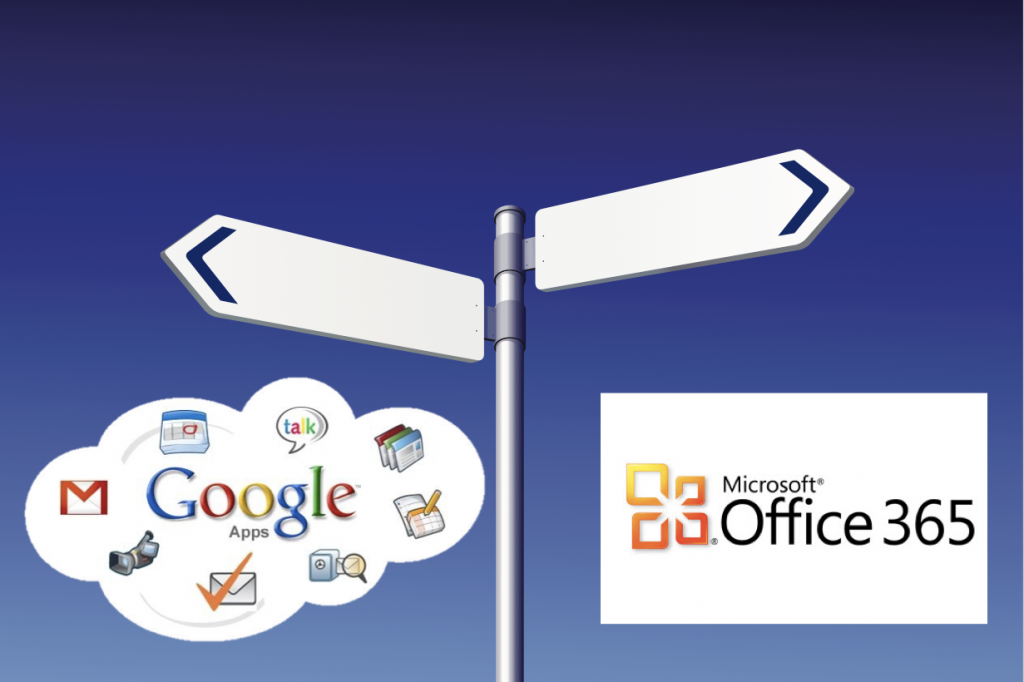Google Apps or Office 365: Which Cloud Platform is Right For You?
4 min read
As cloud computing becomes more popular, more cloud service providers continue to enter the market. But two platforms, in particular, regularly create buzz and attract huge customer bases. Google Apps and Office 365, Google’s and Microsoft’s cloud computing platforms, are two of the most widely used cloud-based services. So how do you know which of these cloud platforms is right for you?

Thanks to Microsoft’s recent “BPOS to Office 365” transition guide, which details what Microsoft users should expect during their transition from Microsoft’s BPOS legacy system to the cloud, there is a wealth of information that can be used to compare Google Apps and Office 365 side-by-side.
Even though the transition guide makes clear that Office 365 isn’t a new product, but simply an evolution of BPOS, it still reports that the transition to the Microsoft cloud will involve a great deal of work. A Google Apps migration, though, regardless of which legacy system you are currently using, is an easy process, made even simpler if you use a Google Apps Authorized Reseller. In the guide, Microsoft also alerts readers that users will be affected by the transition to the cloud.
However, Microsoft continues that any further service updates will have a smaller effect on users. Though smaller, users will still be impacted by updates. This factor is important to take into consideration because Office 365 requires regular patching and service updates since it stores some data on the desktop. Additionally, planned service outages are not included in the 99.9% uptime guarantee under which Office 365 operates. In contrast, Google maintains that updates will not affect users. All service and updates are included in Google Apps’ 99.9% uptime guarantee, which it regularly exceeds. One key point here to take into consideration is that Microsoft is a newcomer to the cloud computing scene, as Office 365 debuted in July 2011, and its uptime is still not completely reliable, with users reporting regular outages.
When it comes to document-creating capability, Office 365 utilizes Office Web Apps while Google Apps uses Google Documents. Office Web Apps is the online version of Microsoft Office and provides users with universal access to their files. Microsoft makes clear that Office Web Apps does not have all the robust capabilities of Microsoft Office, and therefore Web Apps works best in conjunction with Microsoft Office installed locally on a desktop. This is especially interesting because Microsoft likes to point out that Google Documents don’t include the full capabilities of Microsoft Office, but neither do Office Web Apps.
Though there are many differences between Google Apps and Office 365, two of the main factors that differentiate the two are pricing and platform availability and the extent to which they are based in the cloud.
As far as pricing and platform availability is concerned, Office 365 and Google Apps differ significantly. Office 365 is only available for businesses and offers different plans with multiple add-ons. The lowest priced plan is $6/user/month ($72/user/year), and only businesses with fewer than 50 people are eligible for this platform. Even so, the Microsoft transition guide makes clear that this basic plan requires add-ons to run the platform in its entirety, as it does not include Office Web Apps and other features. Microsoft offers three other plans, as well. Google Apps offers four different platforms tailored to businesses, educational institutions, governments, and non-profit organizations (as well as the free version that many people use for their personal email). The most expensive of these platforms is Google Apps for Business, which runs at $50/user/year, making it still less costly than Office 365. Google Apps pricing is standard no matter how many employees a business has, and also includes the full platform of tools like Gmail, Google Documents, Google Sites, Google Cloud Connect, and more.
When it comes to the cloud, Office 365 and Google Apps are different types of platforms. Office 365 is a hybrid cloud solution, meaning that it is not entirely in the cloud as it requires on-premises servers to store data. These servers require updates, patching, and licensing, and take some control out of the hands of administrators. Google Apps, on the other hand, is a fully cloud-based solution, as it lives within the confines of the web browser and does not require any additional hardware or software.
From migration and reliability to pricing, platforms, and the extent to which they are cloud based, Google Apps and Office 365 have a number of very important differences, made even clearer by Microsoft’s new transition guide. As a result of these differences, when looking to move to the cloud it is important to assess what your needs are and which service can best meet these needs.
Cloud Sherpas is a leading cloud service provider and was named the “Google Enterprise 2011 Partner of the Year.” As one of the first Google Enterprise partners, Cloud Sherpas has migrated over one million users across a variety of industries from legacy, on-premise messaging systems to Google Apps, helping organizations adopt cloud computing to innovate and dramatically reduce their IT expenses. A Google Apps Reseller in Atlanta, GA, Cloud Sherpas has regional offices in locations including San Francisco, New York, Chicago, Austin and Sydney, and has more Google Apps Certified Deployment Specialists than any other partner in the world.





